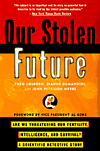Why would Dale Murphy, a senior geologist with Enserch Exploration, leave a $58,000-a-year job in Dallas and take his family to a remote town in Colorado where the employment opportunities range from sorting cherries to working a supermarket cash register?

The Murphy family, home on the range.
Photo: Lisa Jones.
Sanity. He and his wife Sheryl didn’t want to raise four-year-old Hayden and seven-year-old Ginger in suburban Dallas.
Dale had a key experience one day while walking across a bridge on a job near Great Falls, Mont. A truckful of teenagers drove by and yelled at him explosively, in unison. “I was just about hurled off the bridge,” recalls the slender, bespectacled Murphy. “I remember thinking, ‘If this was a really small town, this wouldn’t happen,'” he says. “Small towns engender civility, I think, because you can’t just vanish into a mall. In a city, people can act like jerks with impunity.”
So while he was investigating drilling a well near Steamboat Springs, Colo., he and his family hit the road in search of small-town America. They investigated all kinds of hamlets, and then found Paonia, a tiny fruit-farming and coal-mining town in western Colorado. “We stumbled here, came over the pass,” he says from the living room of the small white house that the family has occupied for four years.
“Sheryl could stay home with the kids, home school ’em,” he says. Dale, then 42, worked in a fruit-packing shed, then started a job as a cashier at the local supermarket, for minimum wage.
“Suddenly, we were on an extremely tight budget,” he says. “We only shop at garage sales, we don’t do cable TV (which is the only way to get reception in Paonia), and we wouldn’t want to anyway. We even make homemade birthday cards.” He animatedly explains how they fashioned a Christmas ornament that sums up their new, scaled-down Christmas celebration: a clothespin holding a penny. I struggle, and fail, to get it. “Pinching a penny!” he says happily, his immaculately behaved son Hayden, now eight years old, bouncing discreetly on the couch next to him.
The family had gone from suburban splendor to rural frugality. The next step was environmentalism.

A couple of years after the Murphys moved to Paonia, Theo Colborn gave a talk in town. Theo, formerly Paonia’s town pharmacist, had gone on to graduate school and then become a World Wildlife Fund scientist, an expert on the hormonal side effects of pollution, and author of the best-selling book Our Stolen Future. For Dale, who had been weaned on the journals of the oil and gas industry, Theo’s talk was a mind-bending experience.
“You can’t escape it,” Dale says. “They’re everywhere — chemicals that are influencing our hormonal and reproductive systems. They’re in the blubber of seals above the Arctic Circle, in sea birds. There are over 500 measurable chemicals in our bodies that were not there prior to 1920, affecting our bodies in many ways. For example, they promote earlier sexual maturity in humans and influence the reproductive systems of many animals.”
Now this Oklahoma-raised former geologist has purchased a piece of hillside outside of town and is looking forward to building a “straw-bale, rammed earth, cob, mud, and straw” house that’s as environmentally benign as possible. His family is turning toward vegetarianism. They buy locally grown organic produce when possible, but Dale gets a discount at work, so they stick mostly to supermarket fare.
Recently, Sheryl started working full-time at Chaco, a local sports sandal factory, and Dale started playing Mr. Mom while staying on part-time at the supermarket. “I saw him one day, on his knees, scraping tape off the window of the freezer at the store, and I thought, ‘What a waste,'” says Sheryl. “Here’s a man with a master’s degree in geology and a great love of children. It was time for a change.”
And they’re happy with it. “We love it here,” says Dale. “What matters to me now is how to change the world a little bit at a time. I can do it by raising our kids right, in the right kind of place. This is not a materialistic town. I’ve been there, done that, and it doesn’t interest me any more.”


